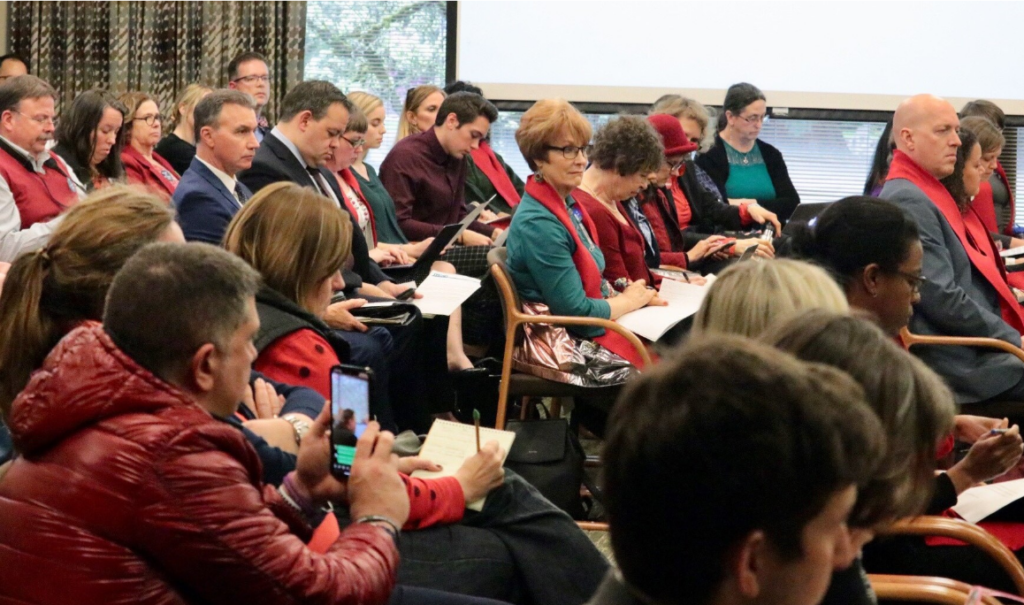
Many in the packed Capitol hearing room Thursday night wore “Red for Ed,” including OSBA Board President Tass Morrison (center, green shirt). Advocates around the country wear Red for Ed to show support for public education and students. (Photo by Rachel Baker, OSBA)
Dozens of students, parents and educators praised legislators Thursday night for their work to increase school investments and, often in emotional testimony, pleaded with them to do even more.
The parade of stories in a Capitol hearing laid bare the failings of Oregon’s chronically underfunded public school system and demonstrated the ways strategic school programs can change people’s lives.
The Joint Committee on Student Success held a nearly four-hour public meeting on its plan to create a fund outside the General Fund to pay for programs to support early learning and preK-12 student achievement.
The committee also posted Thursday its revenue plan to support the fund but did not discuss it.
The amendment from the committee’s revenue subcommittee would create a 0.49% “Corporate Activity Tax” on business receipts above $1 million, with a 25% deduction for inputs or labor costs. The committee has aimed to raise roughly a net $1 billion a year after lowering most personal tax rates by a quarter percentage point.
“It’s finally an opportunity for the state to create sustainable funding to support our students’ success,” said OSBA Executive Director Jim Green before the hearing.
Green testified in support of the act, along with Confederation of Oregon School Administrators President Samantha Steele, Oregon Education Association President John Larson and Stand for Children Oregon Executive Director Toya Fick.
“The plan you have before you is a plan that I believe will make a difference in students’ lives,” Green testified.
Steele said the Student Success Act has the potential to alter the trajectory of Oregon public schools.
“The message from the education community could not be more clear: We need a significant investment in Oregon education to better prepare our students and improve outcomes,” said Steele, Central Point School District superintendent. “Clearly, you heard that message.”
Dozens of parents, teachers, administrators and education advocates told stories about the needs of students, teachers and schools and urged the bill’s passage. Education supporters lined the hall more than an hour before the hearing to testify and listen, and they hung around late into the evening to cheer committee members as they left after the hearing.
The Student Success Act would create a dedicated revenue stream to help stabilize the State School Fund at current service levels and to create three education accounts: Early Learning, District Improvement and Statewide Initiatives.
The Early Learning and Statewide Initiatives accounts, which would get half the new money after the State School Fund payment, would support statewide efforts to improve education. The District Improvement Account would provide enrollment-based grants that districts could use for approved programs, with an emphasis on social and emotional supports and equity.
OSBA and its education partners are working with legislative leadership over some of the details. OSBA would like to see education service districts receive a share of the grants to help support district programs. Education advocates and legislators are also discussing the right balance of local flexibility and state oversight with the new money.
Gov. Kate Brown testified Thursday to praise the committee’s work as well as to ask the committee to include money for higher education. Brown’s balanced budget proposal in November cut funding for higher education, but she also submitted an investment budget where she envisioned restoring that money and more if the state raised its revenue.
Student Success Committee Co-Chairs Sen. Arnie Roblan and Rep. Barbara Smith Warner have made clear that their committee’s directive was to improve K-12 public education.
A revenue amendment that included funding for higher education was accidentally posted Thursday afternoon, creating a bit of an uproar.
Asked in his office, Senate President Peter Courtney emphatically declared the Student Success Act would not be used to fund higher education.
The revenue amendment posted later Thursday night said: “The moneys in the fund shall be used solely for the purpose of funding early learning programs and prekindergarten through grade 12 level education.”
Oregon Democrats have a supermajority in both legislative chambers, enabling them to pass tax measures without Republican votes. A tax measure would likely face a ballot challenge, though.
The Student Success Act has addressed some of the concerns of fiscally conservative legislators and the business community. The committee has tried to craft a tax that is broad-based, as low as possible and sensitive to small businesses. Legislative Revenue Office projections show long-term economic benefits for residents and businesses with more students receiving a better education.
The revenue would be dedicated to education accounts outside the General Fund with accountability measures to try to ensure the money is spent effectively and where the public wants it.
– Jake Arnold, OSBA
[email protected]